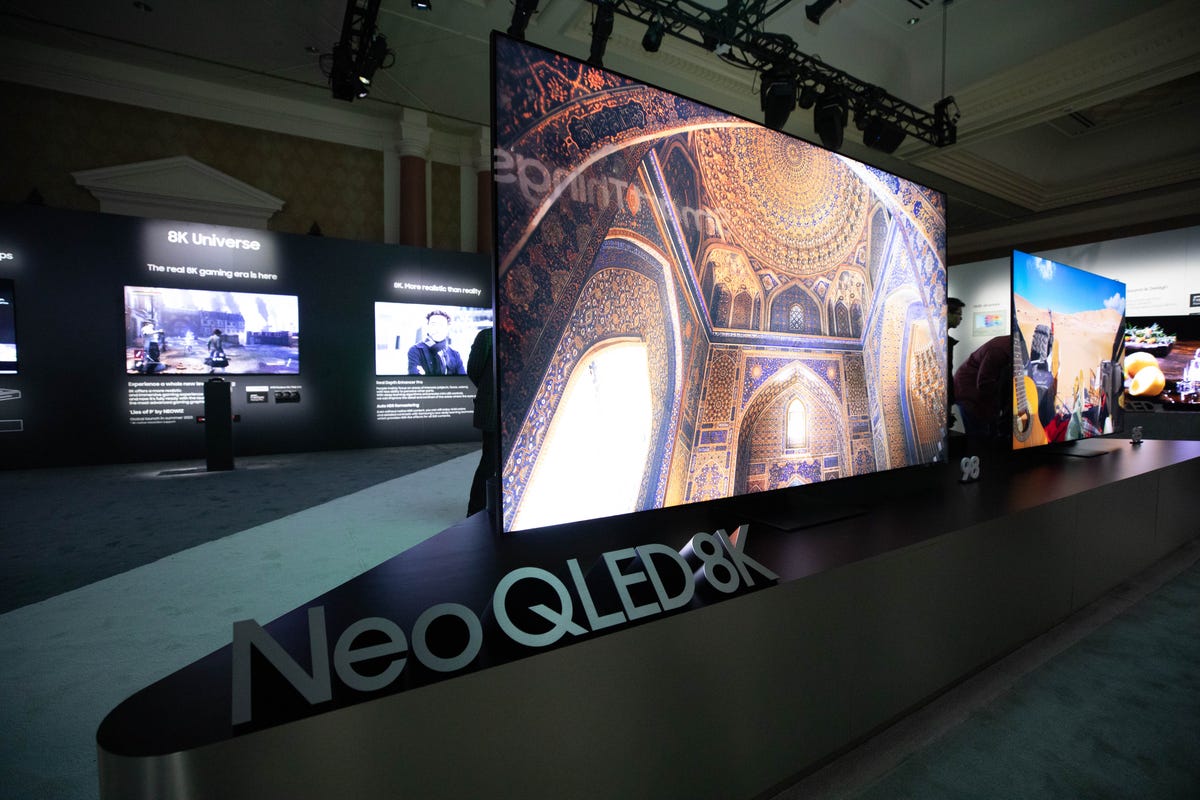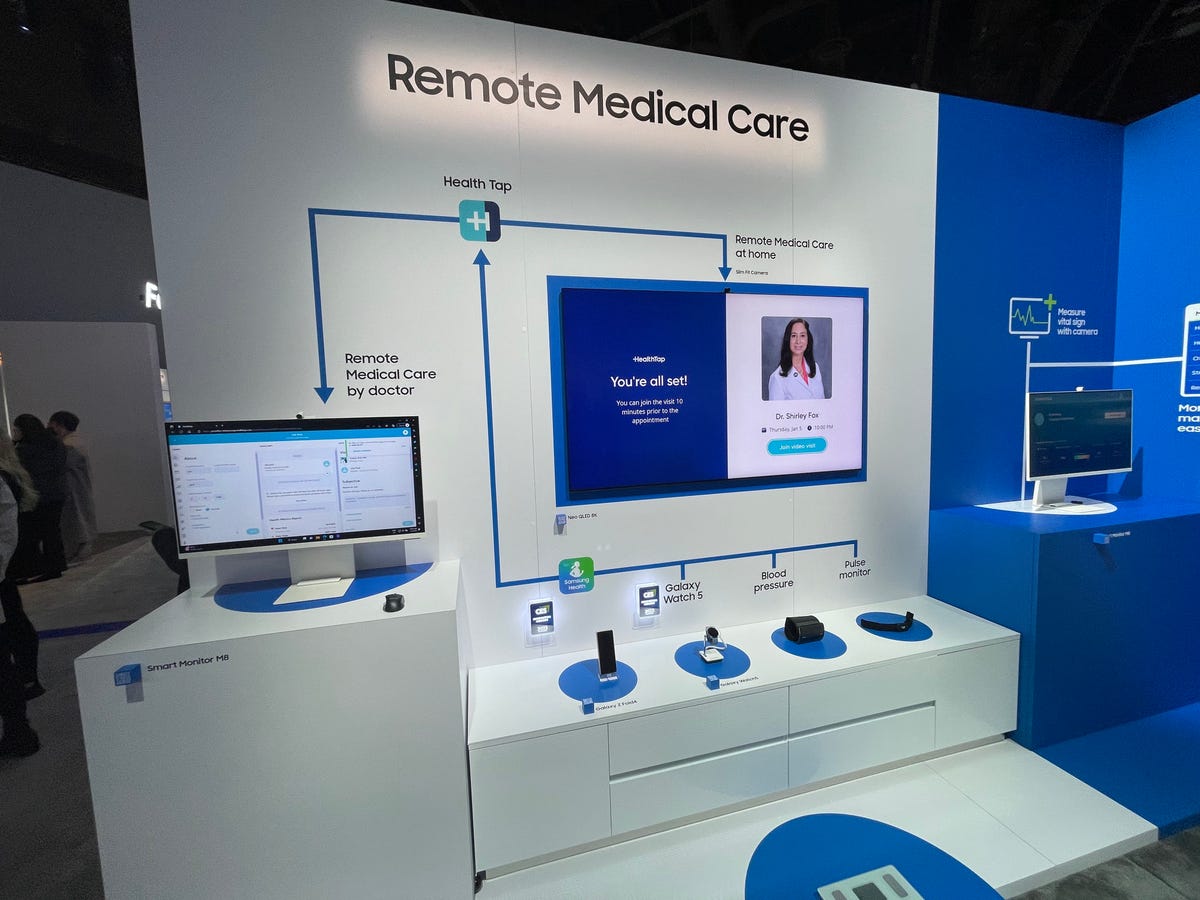
Get ready for the TVs of 2023. New televisions announced at CES will start hitting store shelves in late winter and spring, and Samsung is among the first to out a price on its big-screen offerings. The biggest TV maker in the world has set the initial prices for its high-end Neo QLED TVs and as you might expect, they’re pretty expensive.
Prices range from the 43-inch QN90C at $1,200 to the 85-inch 8K QN800C for a cool $6,000. Neo QLED is the name Samsung uses to denote TVs with mini-LED backlights, which deliver improved picture quality in CNET’s tests — although not as good as OLED, a technology Samsung also sells. The 2023 Neo QLED lineup includes two series with 8K resolution and three with 4K.
The company says the new models deliver brighter highlights, an essential aspect of image quality. High-end Samsung QLED TVs are generally very bright, but the top-of-the-line 8K QN900C takes it to a new level. Samsung boasts up to 4,000 nits of peak brightness, which, if true, would make it the brightest TV I’ve ever measured. According to my tests, Samsung’s peak brightness claims come with a big catch: They dim after a few seconds. Even so, I expect that TV to be exceedingly bright.

Samsung’s 8K QLED TV now comes in a gigantic 98 inches.
James Martin/CNET
Samsung currently sells 98-inch TVs in 4K resolution, but the 98-inch QN900C would be its first in 8K. Samsung hasn’t announced pricing on any of these models yet but for reference, the current 4K 98-incher costs a cool $15,000, so the 8K version will likely be significantly more.
Samsung’s second 8K series, the QN800C, won’t be as bright as the 900C, has a 60Hz refresh rate and comes with a slightly wider frame around the screen. Both models also use Samsung’s One Connect box for HDMI and other connections to external gear. And I still don’t think 8K resolution is worthwhile in any size.
All of Samsung’s Neo QLED models, both 4K and 8K, include full-array local dimming. Samsung says it has improved image quality this year, with better local dimming, 14-bit processing, AI upscaling, Auto HDR remastering and anti-reflective technology on every model. While I don’t expect any of those enhancements to allow this QLED TV to beat OLED models, the Samsung QN90B was my favorite non-OLED TV of 2022 so I expect the QN90C to be just as good.
Beyond improving image quality, Samsung touted some new features related to its optional camera. Samsung sells its own “easily detachable, privacy-focused videoconferencing and workout-assisting camera” for $100, or you can attach a third-party camera. Either way, the camera can monitor your health — including heart rate, oxygen saturation and stress — by detecting changes in facial skin color. You can use it to connect to and communicate with your doctor. The camera can also be used for video calls with a new app, to check in on pets or others in the living room or to assist in workouts.
Read more: Samsung’s New Telemedicine App, Camera Aims to Give Your TV Telehealth Powers

Samsung is branching out into remote medical care on its TVs and other devices.
David Katzmaier/CNET
Samsung’s QLED TVs like the QN90B have great design and features, including built-in cloud gaming, which I like but hardly consider a must-have. On the other hand, they generally cost more than other sets with similar image quality, so I don’t consider them as good a value as models like the TCL 6-Series or Hisense U8H. I got the chance to check out some of the new QLED TVs in person at CES and while they look great, the real question will be how they compare to other 2023 TVs for the money. I won’t know that until I can review them for real, which I expect to happen this spring.
In the meantime here’s the pricing and availability information Samsung announced (note that “TBD” means Samsung hasn’t set a price yet). The company says all of the series below, except the QN95C, “will be part of the phased rollout at authorized retailers nationwide this week, with additional sizes and lines to be announced at a later date.”
One note on the refresh rate column below. Many of Samsung’s models include a 144Hz capability but that’s mainly useful for high-end PC cards; consoles like Xbox Series X and PS5 max out at 120Hz. And refresh rate varies per size; the only 2023 Neo QLED models that lack 120Hz are the smaller two sizes in the 8K 800C series, while only ther smaller members of the QN90C series get 144Hz.
Samsung Neo QLED pricing for 2023
| Model | Series | Resolution | Size | Refresh rate | Price |
|---|---|---|---|---|---|
| QN98QN900C | QN900C | 8K | 98 | 144Hz | TBD |
| QN85QN900C | QN900C | 8K | 85 | 144Hz | TBD |
| QN75QN900C | QN900C | 8K | 75 | 144Hz | $6,300 |
| QN65QN900C | QN900C | 8K | 65 | 144Hz | $5,000 |
| QN85QN800C | QN800C | 8K | 85 | 120Hz | $6,000 |
| QN75QN800C | QN800C | 8K | 75 | 60Hz | TBD |
| QN65QN800C | QN800C | 8K | 65 | 60Hz | $3,500 |
| QN85QN95C | QN95C | 4K | 85 | 144Hz | $5,800 |
| QN75QN95C | QN95C | 4K | 75 | 144Hz | $4,200 |
| QN65QN95C | QN95C | 4K | 65 | 144Hz | $3,200 |
| QN85QN90C | QN90C | 4K | 85 | 120Hz | $4,800 |
| QN75QN90C | QN90C | 4K | 75 | 120Hz | $3,300 |
| QN65QN90C | QN90C | 4K | 65 | 120Hz | $2,800 |
| QN55QN90C | QN90C | 4K | 55 | 120Hz | $2,000 |
| QN50QN90C | QN90C | 4K | 50 | 144Hz | $1,600 |
| QN43QN90C | QN90C | 4K | 43 | 144Hz | $1,200 |
| QN85QN85C | QN85C | 4K | 85 | 120Hz | $3,800 |
| QN75QN85C | QN85C | 4K | 75 | 120Hz | $2,700 |
| QN65QN85C | QN85C | 4K | 65 | 120Hz | $2,000 |
| QN55QN85C | QN85C | 4K | 55 | 120Hz | $1,500 |

